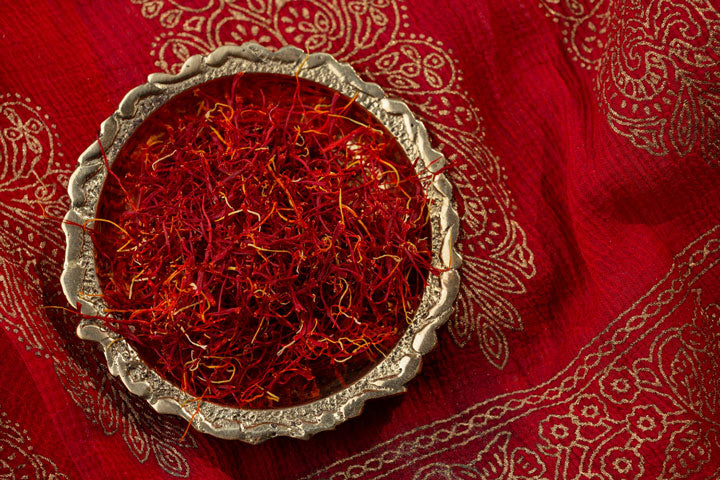What Happens If You Take Saffron Everyday?

Introduction to Saffron
What Is Saffron?
Saffron is a golden-red spice derived from the dried stigmas of the Crocus sativus flower. Known as the most expensive spice in the world, saffron has been valued for centuries not just for its unique flavor and color but for its impressive health benefits.
A Brief History of Saffron Usage
Historically used in Persian, Indian, Greek, and Arabic medicine, saffron has been a go-to remedy for ailments ranging from melancholy to menstrual issues. In ancient texts, it’s even referred to as “red gold” due to its high price and powerful medicinal value.

Nutritional Profile of Saffron
Key Active Compounds
Saffron’s magic lies in its bioactive compounds, including:
-
Crocin – responsible for the deep red color and packed with antioxidant properties.
-
Safranal – gives saffron its distinctive aroma and helps uplift mood.
-
Picrocrocin – imparts the bitter taste and contributes to health benefits.
Vitamins and Minerals in Saffron
Saffron also contains small but potent amounts of:
-
Vitamin C
-
Vitamin B6
-
Iron
-
Potassium
-
Magnesium
Benefits of Taking Saffron Daily
Mood and Mental Health
Ever felt instantly better after a warm drink with saffron? That’s no coincidence.
Saffron is known as a natural antidepressant. Studies show daily intake can reduce symptoms of anxiety, stress, and even clinical depression. It works by boosting serotonin levels in the brain—just like some prescription antidepressants, but without the side effects.
Antioxidant Powerhouse
Saffron helps your body fight off oxidative stress. The antioxidants in saffron protect cells from damage, slow aging, and lower the risk of chronic diseases like cancer.
Hormonal Balance
Daily saffron use has been shown to regulate menstrual cycles, relieve PMS symptoms, and even ease menopausal discomfort. It gently nudges your hormones into harmony.
Eye Health Boost
With age, your vision might not be as sharp—but saffron could help. It’s been linked to improved retinal function and may help slow the progression of macular degeneration.
Saffron and Weight Management
Appetite Suppression
Trying to avoid mindless snacking? Saffron might be your new best friend. It naturally curbs cravings and helps you feel full for longer, making it easier to stick to a healthy diet.
Metabolism Support
Saffron helps maintain a healthy metabolism, making sure your body is efficient in burning fat and converting food into energy.

Saffron for Skin and Hair Health
Glowing Skin from Within
That “saffron glow” isn’t just a saying. Thanks to its anti-inflammatory and antioxidant properties, daily saffron intake promotes clearer, brighter, and more even-toned skin.
Hair Growth and Strengthening
Saffron nourishes hair follicles, prevents hair fall, and can even support new growth. It's like giving your hair a natural multivitamin.
Sexual Health and Fertility
Libido Enhancer
Saffron has long been known as an aphrodisiac. It increases blood flow, improves mood, and enhances libido in both men and women.
Support for Fertility
It also helps with improving sperm motility and ovulation cycles, which can aid couples trying to conceive.
Saffron and Heart Health
Reducing Cholesterol
Saffron helps reduce LDL (bad) cholesterol levels and increase HDL (good) cholesterol, making it a heart-healthy addition to your daily routine.
Blood Pressure Regulation
It acts as a natural vasodilator, helping blood vessels relax and lowering blood pressure in a gentle, sustained way.
Saffron and Blood Sugar Levels
Managing Diabetes Naturally
Preliminary studies suggest saffron can enhance insulin sensitivity and regulate blood sugar levels—especially useful for those with Type 2 diabetes or prediabetes.
How to Take Saffron Daily
Dosage Recommendations
The ideal dosage for most people is 30–50 mg per day. That's about 10–15 saffron threads.
Best Ways to Consume It
-
Soaked in warm milk or water
-
As a tea infusion
-
In capsules or supplements
-
Mixed into food like rice, smoothies, or even desserts
Possible Side Effects of Daily Saffron Use
When Too Much is Harmful
While saffron is safe in moderate amounts, over 5 grams per day can be toxic. Always stick to recommended dosages.
Who Should Avoid It?
-
Pregnant women (in large amounts, it may induce contractions)
-
People with bipolar disorder (it may trigger mania)
-
Anyone with allergies to crocus or similar plants
Myths and Misconceptions
-
Myth: Saffron only adds color to food.
-
Truth: It’s a powerhouse of health benefits.
-
-
Myth: It’s addictive.
-
Truth: Saffron has mood-lifting properties but isn’t habit-forming.
-
Scientific Studies Supporting Saffron’s Benefits
Numerous studies support saffron’s health claims, including:
-
A 2013 study in Phytotherapy Research showing saffron is as effective as fluoxetine for depression.
-
A 2016 study that demonstrated saffron improved PMS symptoms significantly.
Final Thoughts on Saffron
Taking saffron daily is like giving your body a golden ticket to better health. From mood to metabolism, skin to heart, this humble spice does it all. Just a few threads a day can make a big difference—no magic potions required.
FAQs
1. Can I take saffron every day forever?
Yes, as long as you stay within the safe dosage. Long-term use in moderate amounts is safe for most people.
2. Can I cook saffron instead of taking it as a supplement?
Absolutely! It’s just as beneficial when added to food or drinks.
3. How quickly will I see results from daily saffron use?
Some people notice mood improvements in a week; other benefits may take a month or more.
4. Does saffron interact with medications?
It may interact with antidepressants or blood pressure meds, so check with your doctor.
References
- Saffron (Crocus sativus L.): A Source of Nutrients for Health and for the Treatment of Neuropsychiatric and Age-Related Diseases
- Saffron (Crocus sativus L.): A Source of Nutrients for Health and for the Treatment of Neuropsychiatric and Age-Related Diseases
- The Multifaceted Therapeutic Potential of Saffron: An Overview Based on Research and Patents
- Saffron Extract as an Emerging Novel Therapeutic Option in Reproduction and Sexual Health: Recent Advances and Future Prospectives
